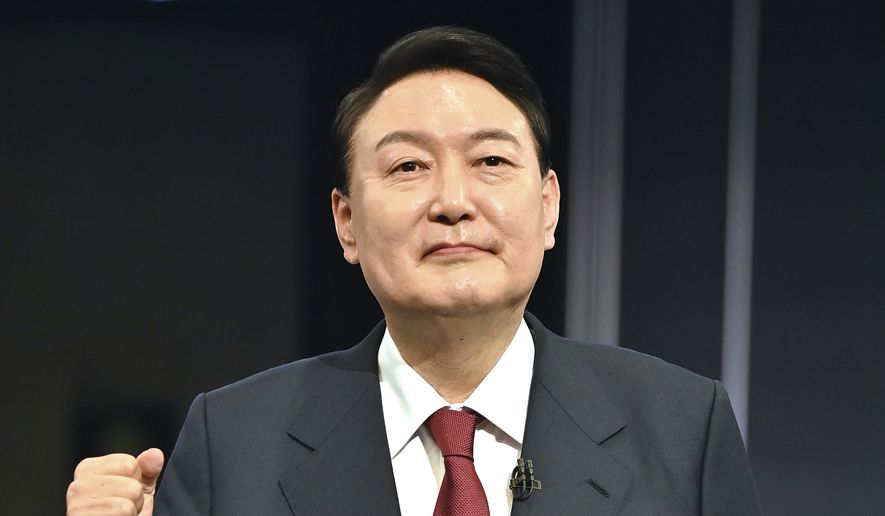OPINION:
South Korea’s new president, Yoon Suk Yeol, in his Liberation Day speech on Aug. 15, reminded the world that “denuclearization of North Korea is essential for sustainable peace on the Korean Peninsula, in Northeast Asia and around the world.”
Mr. Yoon’s speech dealt with his “audacious initiative” to encourage North Korea to return to negotiations to initially halt and eventually denuclearize. In return, North Korea would receive a large-scale food and agriculture program, assistance for power generation, projects to upgrade ports and airports for international trade, modernization of hospitals and medical infrastructure, and initiatives to encourage international investment.
Mr. Yoon’s economic proposal to the North was predicated on complete and verifiable denuclearization, a goal we have been pursuing for the past 30 years. Unfortunately, the few fleeting successes we’ve had — the 1994 Agreed Framework, the Six-Party Talk’s Sept. 19, 2005, Joint Statement and the 2018 Singapore Summit — all eventually failed. Currently, North Korea reportedly has between 40 and 60 nuclear weapons and is capable of miniaturizing and mating them to short, intermediate and long-range ballistic missiles.
The Yoon administration’s understandable focus is getting North Korea to halt and commence with denuclearization, given that North Korea ended its moratorium on nuclear and missile tests and, in 2022, launched 31 ballistic missiles, which included an intercontinental missile capable of reaching the United States, hypersonic and submarine-launched ballistic missiles, and the likelihood of a seventh nuclear test. Mindful of 30 years of failed negotiations, it’s not surprising that concurrent with this economic outreach to the North, the Yoon administration is also focusing on enhancing deterrence, with the reintroduction of upgraded joint military exercises that will commence on Aug. 22 (Ulchi Freedom Shield) with the United States and clear pronouncements that South Korea would respond to any nuclear escalation and provocation from the North.
Most of the so-called experts who follow developments with North Korea are outspoken in their assessment that North Korea will never abandon its nuclear weapons; that a policy that contains and deters North Korea is the only viable strategy for dealing with a belligerent North Korea.
This view was reinforced by statements this week from Kim Jong-un’s sister, Kim Yo-jong, who said North Korea had no intention of abandoning its nuclear weapons and ballistic missiles for economic cooperation. This was not too surprising, in that North Korea consistently has demanded security assurances and the lifting of United Nations-imposed sanctions as core demands for any dialogue dealing with complete and verifiable denuclearization.
Since the failure of the Hanoi Summit between former President Donald Trump and Mr. Kim in February 2019, North Korea has publicly enhanced its relationship with China and Russia. With China, it’s going back to a relationship as close to “lips and teeth.” With Russia, it’s Pyongyang’s support for the Russian invasion of Ukraine and recognizing the independence of the republics of Donetsk and Luhansk and media reports that North Korea may send troops to Ukraine to help Russia. And in May 2022, Russia and China vetoed for the first time a U.S.-drafted United Nations Security Council resolution to strengthen sanctions on North Korea for the missile tests in 2022 that violated previous United Nations resolutions.
It should be obvious that Russia and China will no longer support United Nations efforts to censure North Korea for continued violations of Security Council resolutions. It’s also obvious that North Korea will continue to upgrade its ballistic missile capabilities while continuing to produce fissile material for nuclear weapons.
Given this provocative behavior from North Korea, and its continued unwillingness to return to negotiations with the United States, Mr. Yoon’s effort to provide a road map that encourages a return to negotiations to initially halt its nuclear program while pursuing denuclearization is a timely and well-intentioned initiative.
Based on our experience from Six Party Talks negotiations with North Korea and the Joint Statement of 2005 that “committed North Korea to abandoning all nuclear weapons and existing nuclear weapons programs and returning, at an early date, to the Treaty on the Nonproliferation of Nuclear Weapons and to IAEA safeguards,” North Korea will also want, on an action for action basis, security assurances and the lifting of sanctions, especially those enacted by the United Nations Security Council after 2016. However, these are issues that can be further pursued with North Korea, assuming eventually they will engage with the new Yoon administration, especially in response to Mr. Yoon’s “audacious initiative” and a subsequent detailed road map that, in an action for action format, provides North Korea with the security assurances, sanctions relief, economic development assistance and a path to normal relations with the United States, South Korea and Japan.
But regardless of Pyongyang’s decision, the Yoon administration’s offer to substantively engage with North Korea in inter-Korean dialogue, while also pursuing with the United States a robust deterrence program with enhanced joint military exercises, is a timely and appropriate strategy.
• Joseph R. DeTrani is the former special envoy for negotiations with North Korea and the former director of the National Counterproliferation Center. The views are the author’s and not any government agency or department.




Please read our comment policy before commenting.